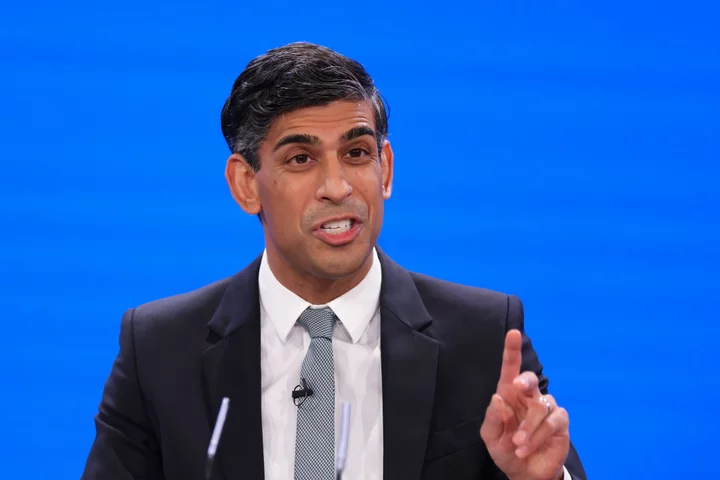Prime Minister Rishi Sunak was hoping his AI summit next month would bring heads of the most powerful nations face-to-face with executives to guard against the technology’s “catastrophic” potential. With less than two weeks to go, the guest list is thin on world leaders.
German Chancellor Olaf Scholz and Canadian Prime Minister Justin Trudeau will join US President Joe Biden in skipping the Nov. 1-2 gathering at Bletchley Park, according to people familiar with the matter, who requested anonymity because plans aren’t finalized. With French President Emmanuel Macron and Japanese premier Fumio Kishida yet to decide that makes Italian premier Giorgia Meloni the sole Group of Seven leader other than the host to sign up so far.
Although there’s still time for late additions, a lack of top state leaders dents the profile of the event as Britain works to forge an international approach to artificial intelligence. Sunak is trying to position the UK at the forefront of development and regulation of a technology that he’s said could be “paradigm-shifting” while at the same time posing risks that require “guardrails.”
Even so, nations are making progress on a joint approach on AI — Britain’s main objective for holding the summit. A draft communique seen by Bloomberg this week shows delegates homing in on language to describe the technology as capable of causing “catastrophic harm.” The document also outlines particular concerns for AI’s impact on cyber-security and biotechnology. Officials aim to hammer out final wording by Oct. 25.
Despite the absentees, all invited nations are sending senior representatives, according to the people. US Vice President Kamala Harris and commerce secretary Gina Raimondo are slated to attend, and Chinese premier Xi Jinping will send delegates in his place. Canada is sending Industry minister Francois-Philippe Champagne, and Germany will be represented by Digital Minister Volker Wissing.
“International representation will vary by country,” the British government said in a statement. “As is entirely normal for summits of this nature, we do not confirm attendees this far in advance but we are confident the right people will be there.”
Israel’s Prime Minister Benjamin Netanyahu had been due to attend, but that now looks unlikely due to the conflict with Hamas in Gaza, the people said. European Union President Ursula von der Leyen’s attendance is now also in doubt due to the conflict.
Some 100 people from 28 nations are expected to attend the summit, which will feature companies and industry experts on Nov. 1, hosted by Technology Secretary Michelle Donelan, and a small group of major companies and governments convened by Sunak the following day.
“This summit is about Sunak appearing as a world leader and the UK setting the agenda, so it does matter who turns up,” said Anand Menon, director of the UK in a Changing Europe think tank. “It will be in the meetings with the US and EU where global approaches to AI will be taken. The UK is simply not a big enough market to have the global clout to make these kinds of decisions on its own.”
Altman, Clegg
Sunak also hopes to welcome a slew of senior Big Tech executives. OpenAI Chief Executive Officer Sam Altman and Adobe Inc. CEO Shantanu Narayen have been invited but neither has confirmed attendance. Microsoft Corp.’s Brad Smith is likely to attend.
Former UK Deputy Prime Minister Nick Clegg, now president of global affairs at Meta Platforms Inc., and James Manyika and Demis Hassabis, from Alphabet Inc.’s Google and DeepMind Technologies Ltd., are also expected to join, people familiar with the matter said. Anthropic’s Dario Amodei, Inflection AI’s Mustafa Suleyman and Cohere’s Aidan Gomez all confirmed their attendance.
“It feels like a real moment for me personally and just for our field to have these issues taken seriously and get everybody around the table,” Suleyman, who grew up in Britain but now lives in Silicon Valley, said in an interview.
Britain aims for further inter-governmental and technology summits to be held twice a year to allow regulation to keep pace with developments. A draft document accompanying the communique sets out proposals to assemble an expert panel of academics from different countries to compile an annual “state of the science” report on AI safety.
Deepfakes
Delegates are expected to discuss risks to cyber-security, biotechnology and election disruption. Members of the British Cabinet told Bloomberg privately that they are concerned so-called deepfake AI could be used during national elections expected next year.
Securing agreement at the summit is an ambitious target for Sunak, with competing views from around the world. One senior minister expressed concerns US technology companies might lean on Biden to limit regulation to light-touch measures to avoid scuppering the potential to create future trillion-dollar AI businesses.
While the US has been supportive of Britain’s efforts, the minister said, it’s prepared to let the UK navigate the tricky task of bringing nations together. By contrast, another senior British minister predicted China would push for stronger state regulation of AI, in line with their philosophy for control of critical national infrastructure.
“In the past there’s been this adversarial relationship between the industry and regulators, and today it’s got to be a much more joint effort working together from day one,” Suleyman said.
--With assistance from Brian Platt, Michael Nienaber, Alberto Nardelli, Thomas Seal, Jillian Deutsch, Isabel Reynolds, Chiara Albanese, Ania Nussbaum, Rachel Metz and Mackenzie Hawkins.
Author: Kitty Donaldson, Ellen Milligan and Jamie Nimmo

